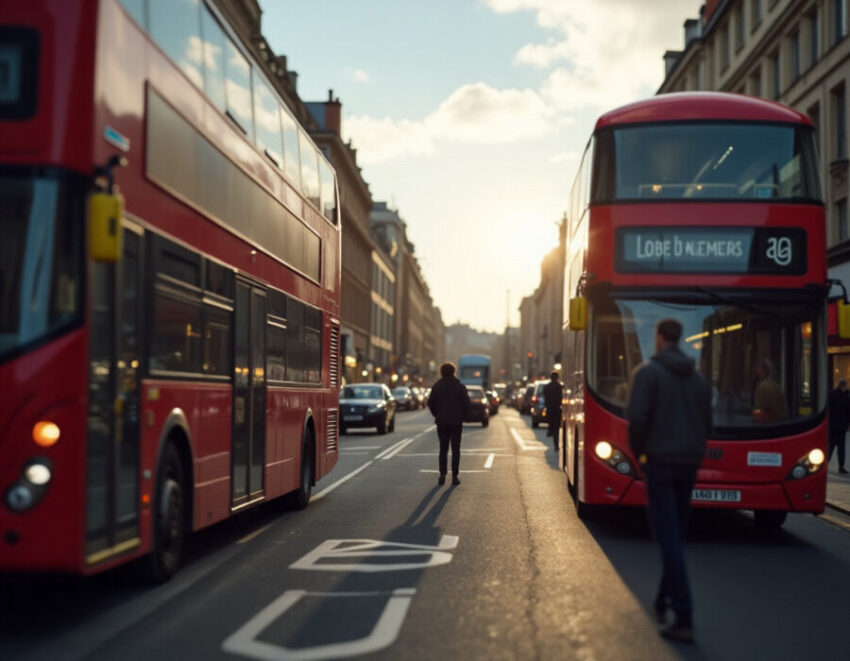Published on
August 21, 2025

As the United Kingdom braces for an extraordinary Bank Holiday travel rush, millions of vehicles are expected to flood major roads, and public transport services are set to experience an overwhelming surge in demand. This unprecedented movement is driven by the long weekend, which runs from Thursday, August 21, to Monday, August 25, as holidaymakers embark on short getaways, day trips, and events. With an estimated 14.4 million vehicles on the roads, coupled with crowded rail services, bus routes, and airports, the heightened demand can be attributed to a combination of the school holiday season, favorable weather, and the desire to make the most of the extended weekend. The resulting congestion is likely to cause delays, forcing travelers to adjust their plans and prepare for an intense period of travel across the country.
The upcoming August Bank Holiday is anticipated to be one of the busiest times of the year for travel across the UK. Traffic monitoring services predict that approximately 14.4 million vehicles will be on the country’s major roads during the extended weekend, which runs from Thursday, August 21, to Monday, August 25. This period is expected to see a significant increase in road traffic as holidaymakers and travelers head out for short breaks or day trips.
Among the days with the heaviest traffic, Friday, August 22, and Saturday, August 23, are predicted to experience the most congestion. The most recent figures from the RAC indicate that around 3.6 million vehicles are expected to be on the roads each of these days, marking them as the busiest travel days of the period. On the other hand, Sunday, August 24, is expected to have considerably lower traffic levels, with only around 1.6 million trips forecasted. This decrease in travel volume on Sunday could offer a brief respite for those on the roads.
Motorists planning to travel during this busy period are being strongly advised to allow extra time for their journeys. Given the expected congestion, delays and slower travel times are inevitable, particularly on the main roads leading to popular tourist destinations and areas of high footfall. Those embarking on long journeys or traveling at peak times should consider alternative routes or travel during quieter hours to avoid the worst of the delays.
With the August Bank Holiday weekend fast approaching, traffic analysts emphasize the need for careful preparation to manage possible disruptions. Drivers are encouraged to check their vehicles beforehand, ensuring they are in good working order to avoid breakdowns or unexpected delays. Additionally, planning ahead for fuel stops, rest breaks, and potential delays can help reduce stress and make the journey more manageable.
For those looking to avoid the crowds, traveling on quieter days or at off-peak times could be a practical solution. Although Sunday is expected to be the least busy day, Friday and Saturday will see large numbers of vehicles on the roads, especially on routes heading to popular vacation spots, coastal areas, and national parks. Traffic will likely be heaviest during the late morning and early afternoon hours, with roads seeing a significant volume of vehicles as people head out to their destinations.
Traveling during the evening or early morning hours on the quieter days might offer a more relaxed experience, as roads tend to be less congested. Drivers are advised to remain flexible with their travel plans and consider adjusting departure times to avoid the worst traffic.
In addition to road traffic, public transport services may also experience increased demand over the Bank Holiday period. Rail services, bus routes, and airports are likely to see higher-than-usual passenger numbers as people make use of public transportation to reach their holiday destinations or attend events. It is recommended that passengers check schedules in advance and book tickets early to avoid last-minute disappointments or complications. The increased demand for seats on trains and buses could lead to crowded conditions, making it more difficult to find available space.
For those planning to travel by car, it’s important to stay informed about potential disruptions caused by roadworks, accidents, or weather conditions. Travelers should regularly check traffic updates and weather forecasts to ensure they are aware of any issues that may affect their journeys. The use of traffic apps and services can help drivers stay up-to-date with live information about delays, road closures, and alternative routes.
While the August Bank Holiday offers a great opportunity for a short getaway, the expected traffic levels should not be underestimated. Motorists and travelers alike should take the necessary steps to prepare for busy conditions on the roads and public transport systems. With proper planning and flexibility, travelers can help ensure a smoother journey and a more enjoyable holiday experience despite the expected congestion.
The United Kingdom is preparing for an unparalleled Bank Holiday travel surge, with millions of vehicles expected on the roads and public transport facing record demand. This massive influx is driven by the long weekend, school holidays, and a desire for short getaways and events.
As the Bank Holiday approaches, keeping in mind the potential for long delays and planning accordingly can make a significant difference in how the weekend unfolds. Whether traveling by car or public transport, making adjustments to travel times, routes, and expectations can help to reduce stress and maximize enjoyment during the busy period.








